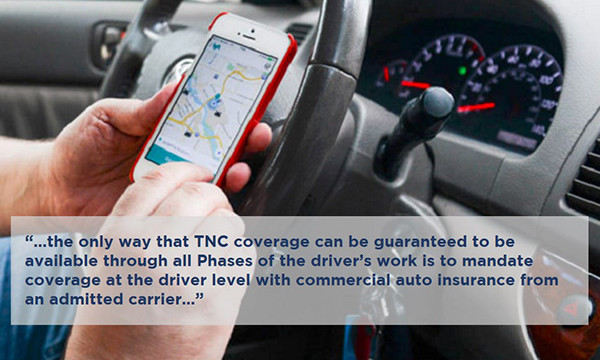-
27 Apr
2016Proposed House Bill No.4064 Will Leave TNC Drivers and the Public at Risk

By Brian Boucher, President, Lighthouse Insurance Agency
Transportation Network Companies (TNCs), the companies that use smartphone communications technology to connect individuals who want a ride with drivers for a fee, may be a relatively new trend in US cities but they are quickly becoming mainstream. Most of us are aware of the top brands in this growing transportation segment – UberX, Lyft and Fasten– and many of us Massachusetts residents are adopting TNCs as our preferred mode of transportation. Key reasons why TNCs have gained popularity so quickly include that they offer customers more flexibility, convenience, and often a better fare than other traditional options. However, there is a downside to such rapid adoption by the public; our state legislature is now finding itself in a game of catch-up particularly as it is related to TNC insurance requirements. What’s most concerning is that many drivers have no idea how exposed they are by gaps in their current insurance coverage, and that they are putting customers at potential risk as well.
Our Massachusetts House of Representatives recently passed Bill No.4064, which includes TNC template legislation created by the National Conference Of Insurance Legislators (NCOIL). This legislation has been adopted by 30 other states in an attempt to close the gaps within TNC’s insurance coverage. Before evaluating the effectiveness of this legislation, it’s important to note that there are three separate working phases when a Driver requires liability insurance coverage. Phase 1 is working and waiting for a ride match; Phase 2 is when a match with a passenger has been made; and Phase 3 is when the passenger is picked up and in the car.
Let’s get into the numbers a bit more specifically. In Phase 1, when the driver has checked into an app like Uber, Lyft, or newcomer Fasten, a Boston-based company, but has not accepted a ride the necessary insurance coverage limits are 50K/100K/30K. Once a ride is accepted and the customer is being transported, the insurance limit goes up to $1M. The template legislation indicates that the various coverages can be provided by the TNC company and/or the driver and that the insurance product can be from a non-admitted carrier. That should be very disconcerting to not only drivers, but also TNCs and the public because a non-admitted insurance carrier does not have rates filed with the state and therefore is not as highly regulated. Sure, TNCs and drivers may be able to get better rates from these carriers, but the trade-off in risk will not be worth it. And should there be any issue with the carrier, such as outstanding claims, Massachusetts will have very little regulatory control or power to do anything.
Another inherent problem with the template legislation is that it assumes that the TNC driver will only work on one TNC platform at a time, and not log in to multiple apps simultaneously. The industry has come so far so fast that it’s clear the future of this segment will be here sooner than later. In fact, I would argue that it is here. TNCs are clearly competing for drivers, so why wouldn’t drivers check multiple apps for the best passenger match? Well they are and by doing so they are unknowingly putting themselves again at risk should they have an accident during the time when they are working but not hired yet. Think about if an accident happens during this time; which TNCs policy would step up and respond? Naturally there is going to be a lot of uncertainty in this type of situation, and typically all the TNC’s insurers would deny coverage. This would leave the driver uncovered by both their own Personal Auto Insurance and the TNC’s policies, obviously an awful situation for the driver and the public. If the current legislation does not reconcile this specific coverage need/gap, then Bill No.4064 will not be satisfactory or protect the public interest.
Our situation in Massachusetts is hardly unique and there is precedence already set in other cities. Both New York and Philadelphia mandated new requirements for admitted commercial auto insurance at the driver level and since doing so TNC operations actually flourished in NYC with a reported 70 different TNCs operating in the city. It is my strong belief, along with many others in the transportation insurance industry that the only way that TNC coverage can be guaranteed to be available through all Phases of the driver’s work is to mandate coverage at the driver level with commercial auto insurance from an admitted carrier. Only an admitted insurance policy will give the state crucial regulatory power as well as access to resources of the RMV to track insurance or cancelled coverage. Truly, this is the only way to guarantee that the public will be covered in the event of an accident.
Bill No. 4064 now rests with the Massachusetts Senate, and while there is no date yet set for the vote, the time for interested parties to act is now. If we are drafting legislation to protect the public and to guarantee the right coverage is afforded, we have to legislate with an eye toward the future where drivers will be working on multiple platforms. It’s my perspective that this future is already here and I ask you to please email your senator today to show your support for having insurance at the TNC drivers’ level.



